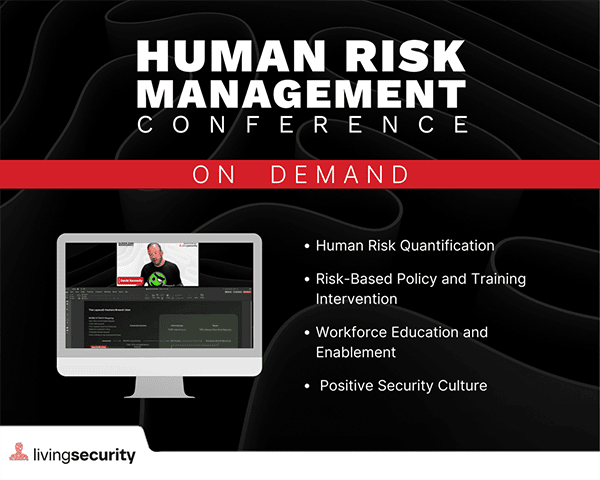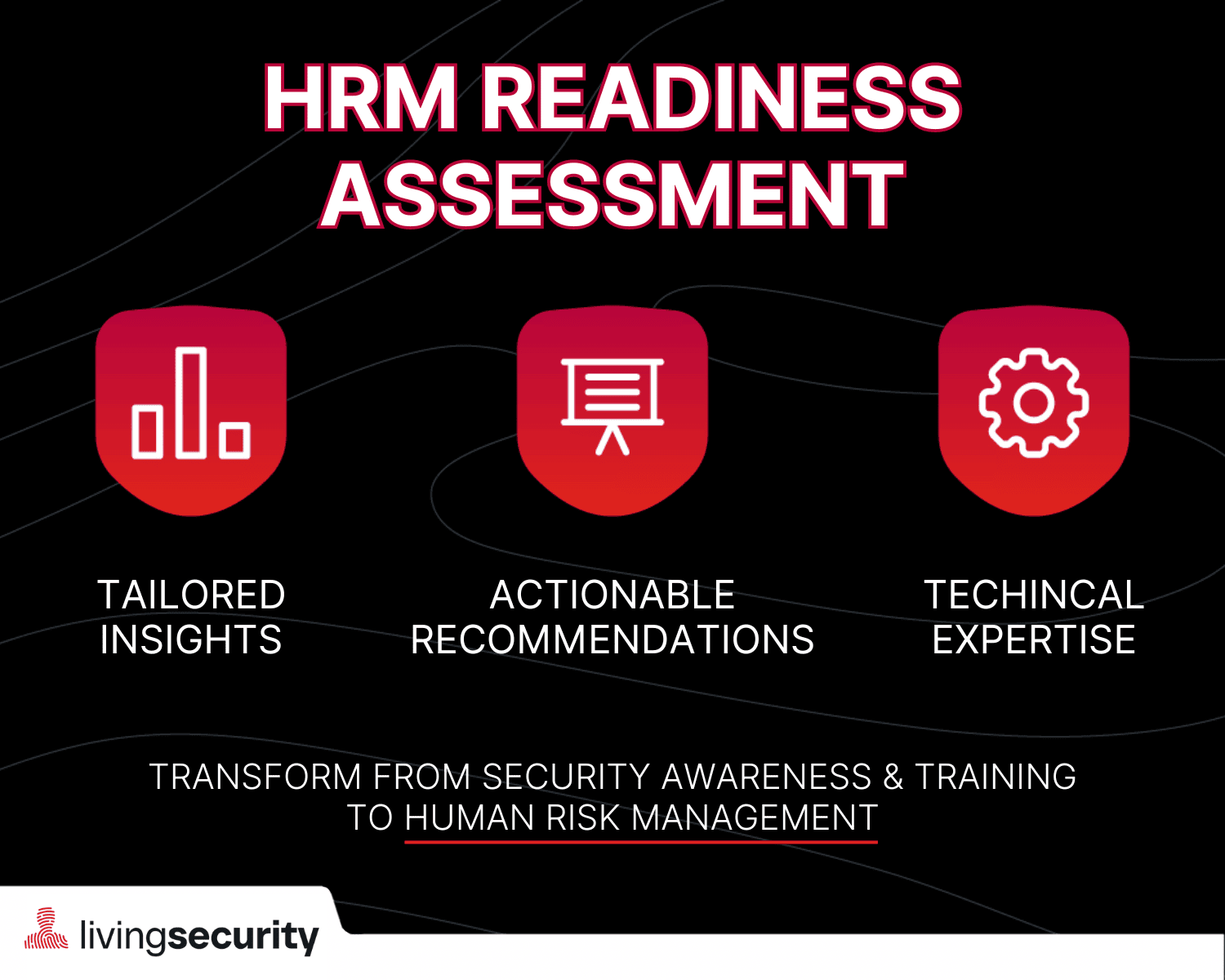
Explore HRMCon
On-Demand
Dive into the insights and discussions from HRMCon. Watch the recorded sessions at your convenience.
Each year, HRMCon brings together cybersecurity thought leaders and practitioners to present a half-day virtual conference geared toward continuously evolving the power of behavior change in mitigating risks.
From Awareness to Ownership: Turning Security Culture into a Measurable Business Outcome
November 13, 1:00 PM CT
Security is often called “everyone’s responsibility,” but it rarely factors into how performance is measured or managed.
In this session, experts from Living Security will explore how human risk scorecards—for both individuals and managers—bring security into everyday performance conversations.
You’ll learn how to:
- Bridge the gap between culture and accountability
- Transform security from a side project into a measurable business outcome
- Advance your HRM program's maturity with progress in the Culture and Workforce Engagement category
A Sneak Peek into Living Security's Scorecards:


TITLE
TITLE
TITLE
TITLE
Breakout Tracks |
|||
Human RiskQuantification |
Risk-BasedPolicy & Training Interventions |
Workforce Educationand Enablement |
PositiveSecurity Culture |
Quantifying Behaviors to Mitigate Human Risk in HRMChris Poirel, Living Security |
Targeting Awareness of Cyber Threats with Risk-Based Policies & Training InterventionsDavid Tunley, Rivian |
Hook, Line, and SinkerAaron Strong, Syniverse |
Building a Robust Security CultureTerry Smith, Blackbaud |
|
|||
Human Risk Management 2.0Jon Brickey, Mastercard |
Empowring Your Human Firewall: Orchestration for Cyber Resilience and TrainingSandy Evancs, Living Security |
How to Deepen Your Career in Security AwarenessCassie Clark, Consultant |
HRM's Role Cultivating a Positive Security Culture for your OrganizationShawnee Delaney, Vaillance Group |
|
|||
The State of Human Risk QuantificationMaria Long, Violet Sullivan & Julian Sylvestro |
MindSecure: Elevating Cyber Resilience through Cyberpsychology and Organization SynergyAllen Ohanian, LA County |
Own Your Security Journey: Empower All Levels to Track Human Risk & Drive Continuous ImprovementErik Book, Living Security |
Borrowing Brilliance: What Security Awareness and Training Should Steal from MarketingMike Taylor, Nationwide |
Connecting Emerging Threat Intel to Human Risk QuantificationJosh Bartolomie, Cofense |
Evolving from Annual Security Compliance Training to Risk-Based Policy and TrainingMichele Kim, Fitch Ratings |
Using Human Risk Management to Drive Behavioral ChangeBrandy Harris, CyberEd |
Scorecards & Vigilance: Unleashing the Power of Your Workforce for a More Secure FutureNick Marchiselli, Living Security |
Conference Tracks
Choose from four exciting conference tracks.1. Human Risk Quantification
2. Risk-Based Policy & Training Interventions
3. Workforce Education and Enablement
4. Positive Security Culture


Brian Krebs
KrebsOnSecurity.com | Independent Investigative Reporter
Fireside Chat: What Breaches Teach Us
The daily drumbeat of data spills, breaches and thefts can foster breach fatigue, apathy and cynicism among even the most hardy security professionals. What sets in is a suspicion that all our efforts are for naught, and that we are perpetually a step behind the bad guys. In truth, most of these incidents are not only preventable, but they take months or years to bubble up. This fireside chat will examine some of the more alarming trends in cybercrime today, and offer some perspectives on how businesses, consumers and infosec pros can up their game in response.

About Brian
Brian Krebs is an independent investigative reporter who writes about cybercrime at the award-winning Web site KrebsOnSecurity.com.
Formerly with The Washington Post (1995-2009), Krebs is best known for breaking stories on high-profile data breaches, including those that hit Target, Home Depot, Michaels, Ashley Madison, and Capital One.
A frequent interviewee and public speaker, Krebs has been profiled by 60 Minutes, The New York Times, Poynter.org, and Business Week. Krebs’s book, Spam Nation: The Inside Story of Organized Cybercrime - From Global Epidemic to Your Front Door – is now a New York Times bestseller. More recently, he was invited to an “Ask Me Anything” discussion on Reddit about investigative reporting.
In January 2015, the National Press Foundation announced it was awarding Krebs its Chairman's Citation, an award designed to "recognize individuals whose accomplishments fall outside the traditional categories of excellence." In October 2014, the Association of Certified Fraud Examiners gave Krebs the "Guardian Award" an honor given annually to a journalist "whose determination, perseverance, and commitment to the truth have contributed significantly to the fight against fraud."
Krebs graduated in 1994 from George Mason University. Today, he lives with his wife Jennifer in Northern Virginia.
Living Security Blog
How Modern AI Attacks Target Employee Access and What Human Risk Management Must Do Next
New Anthropic research shows how a Chinese state sponsored group used AI to automate reconnaissance, exploit development, and credential harvesting across global targets. The attack succeeded because stolen usernames and passwords unlocked high privilege access. This article explains how Human Risk Management strengthens the identity layer by correlating security signals to human behavior and reducing the weak points AI driven attackers now exploit.


The Future Is Now: Introducing Human Risk Management. This is not just a name change. It is a significant change of mindset, strategy, process, and technology about how we approach an old problem in a new world.
Jinan Budge



The Future Is Now: Introducing Human Risk Management. This is not just a name change. It is a significant change of mindset, strategy, process, and technology about how we approach an old problem in a new world
Jinan Budge
























